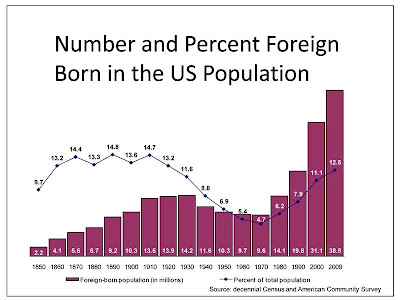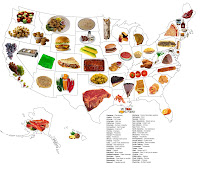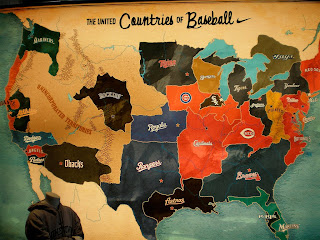Sunday 30 October 2011
The future of America
Saturday 29 October 2011
Week 5: The New American
 http://blogs.census.gov/directorsblog/2011/03/the-future-of-the-us-advertising-industry.html
http://blogs.census.gov/directorsblog/2011/03/the-future-of-the-us-advertising-industry.html"Here individuals of all nations are melted into a new race of men, whose labours and posterity will one day cause great changes in the world." P.44
Friday 28 October 2011
Week 5 - The New American

Thursday 27 October 2011
De Crèvecœur’s Ideas in Contemporary America
“Go thou, and work, and till; thou shalt prosper, provided thou be just, grateful, and industrious.” Chapter 3: What is an American? P.66
This quote highlights the main ideologies of the American Dream; where by working hard, you will be rewarded and ‘prosper’. This ideal is one of the main attributes to being American as it shows determination and this vision of America still survives today.
My example of this is the ‘rags to riches’ story of Chris Gardner. The term ‘rags to riches’ is the idea of coming from nothing but being able to become successful. Chris Gardner came from an underprivileged African American background which saw him being kicked out of his house at a young age. After joining and leaving the navy, he became a salesman, but was not very successful. He then, through working hard went on to become a broker and entrepreneur, and is now a millionaire.
This example shows that De Crèvecœur’s vision of American still survives today because Chris Gardner worked hard and unpaid for several weeks as an intern. At several points he found himself homeless and slept in shelters, on buses and even in a public toilet. Despite this, he still managed to continue to work hard and eventually got a job as a broker for a prestigious firm.
His story appears to follow everything De Crèvecœur talked about, to a t, as he [Chris Gardner] did indeed become prosperous. In numerous interviews Gardner has mention how he was grateful to the reverend who allowed him to stay at the Glide Memorial United Methodist Church; this is in direct link to when De Crèvecœur says 'be [...] grateful'. Gardner was also the first to arrive at work, the last to leave and was able to make over 200 phone calls a day; this is also in direct link to when De Crèvecœur says 'be [...] industrious'. Through all of these things (eg. being grateful, industrious and working hard), it can be argued that Gardner is a contemporary example of De Crèvecœur's vision of what it means to be an American, and that his idea survives in America today.
His story was immortalised with his 2006 autobiography, 'The Pursuit of Happyness' and then by the film based on the autobiography of the same name in late 2006.
Sunday 23 October 2011
Week 4 - Exploration and Expectation
"Brothers, your resolutions are very surprising. Where is there any one or body of men to be compared to the King? As for General Schuyler, (and the other Commissioners,) of whom you boast so much, what is he? He was born but yesterday; just now, as it were, started up out of the ground, and tomorrow will return into the earth whence he came. It will not be the space of a month before you hear him cry. He has no men, guns, cannon and ammunition, or clothing; and should he survive the summer, he must perish by the cold next winter for want of blankets. But the King wants neither men nor money; there is no computing his numbers. As to theCaughnawagas claiming seven tribes as under their jurisdiction, it is false; they tell a lie. The Caughnawagas are by themselves alone, and they are become Bostonians. But the other six tribes in that vicinity, with all the back nations, are at the King' s command and will take his side. And as for Canada, they are all (except twelve persons) returned to the King' s side.
"Brothers, you had better recall your resolutions, and determine to keep the King' s peace, and the King will then be glad to hear from you. What a wretched situation must you be in when the King attacks all the seaports ofAmerica, and comes in earnest to sweep off the Americans, if he finds you supporting the Americans!"
This is a letter from colonel butler in reply to a letter from s.kirkland- a New England missionary among the Oneidas. The Oneidas are Native American people who originally inhabited the area of central New York. The Oneidas, along with the five other tribes of the Iroquois Confederacy, initially maintained a policy of neutrality in the American Revolution. This policy allowed the Confederacy increased leverage against both sides in the war, because they could threaten to join one side or the other in the event of any provocation. However neutrality quickly crumbled.
In this letter colonel butler seems annoyed that the Oneidas are maintaining peace with the new settlers, and is warning them of the repercussions if they were to take the side of the new settlers over that of their king.
This extract shows the wide opposition in both America and Canada against the new settlers and the pressure for tribes not to maintain peace with them. The colonel seems adamant that the new settlers, with their lack of resources are highly unlikely to survive the winter, ‘’he must perish by the cold next winter for want of blankets.’’ This shows how the tribes saw the new settlers. They were unprepared for the weather and didn’t have the same experience as the tribes to survive in the wilderness.
This extract gives us an insight into the views of the tribes towards the new settlers and how they didn’t believe they stood a chance of survival and shows how most were unwilling to be accommodating to the settlers and didn’t appreciate the invasion of their land.
Week 3 - What The World Thinks Of America
Week 4
Saturday 22 October 2011
Week 4: An Account of a Settler in the United States
http://nationalhumanitiescenter.org/pds/becomingamer/growth/text1/pennsylvaniapastorius.pdf
This account was written by Francis Daniel Pastorius, founder of the first German settlement in Pennsylvania, written in the 1690's. As it states in the introductory of this account, Pastorius wrote several accounts of the middle Atlantic colony to encourage his fellow countrymen to emigrate to America. From his account I have made specific references to the Native Americans and their appearance. From the discussions surrounding the appearance of the Native Americans from Wednesday's class, its clear that what defined Native Americans were their physical bodies and strength. What differentiates Native Americans from the settlers were not only their sense of dress, but also the way in which, according to Pastorius, were'...in general, strong, agile, and supple people, with blackish bodies...'
In addition to this, Pastorius also focuses a lot on religion, and the importance that it has over the Native Americans culture. ' I thought to myself, these savages have never in their lives heard the teaching of Jesus concerning temperance and contentment, yet they far excel the Christians in carrying it out...'. Pastorius' account draws heavily on the influence of religion and the effect that it had on the Native people. Despite their upbringing lacking in obvious Christian values, they are still shown to exhibit them. Christian values were an important factor that existed within the tribes, even to the extent that they portrayed and carried out their loyalty, according to Pastorious, better than traditional Christians did themselves.
Finally, from the above extract, Pastorious also notes how many Europeans attempted to change America, and the Native Americans within them. In particular their intent was to calm the Native Americans, and to some extent make them passive. An additional aim was to modernise America by 'erect[ing] new cities and colonies, and not only to gain thereby our own temporal advantage... and to instruct them in the true knowledge of God, insomuch that I live in the hope of being able to announce more good news of their conversion to Christianity within a short time...'. It could be argued that this was the beginnings of the New America.
Friday 21 October 2011
Early Settlers Account of the Native Americans
In April following they set out two small vessels under the command of Capt. Philip Amidas and Capt. Arthur Barlow, who after a prosperous voyage, anchored at the inlet by Roanoke, at present under the government of North Carolina. They made good profit of the Indian truck, which they bought for things of much inferior value, and returned. Being overpleased with their profits, and finding all things there entirely new and surprising, they gave a very advantageous account of matters, by representing the country so delightful and desirable, so pleasant and plentiful; the climate and the air so temperate, sweet, and wholesome; the woods and soil so charming and fruitful; and all other things so agreeable, that paradise itself seemed to be there in its first native lustre.
They gave particular accounts of the variety of good fruits, and some whereof they had never seen the like before; especially, that there were grapes in such abundance as was never known in the world. Stately tall large oaks, and other timber; red cedar, cypress, pines, and other evergreens and sweet woods, for tallness and largeness, exceeding all they had ever heard of; wild fowl, fish, deer, and other game in such plenty and variety, that no epicure could desire more than this new world did seem naturally to afford.
And to make it yet more desirable, they reported the native Indians (which were then the only inhabitants) so affable, kind, and good-natured; so uncultivated in leaning, trades, and fashions; so innocent and ignorant of all manner of politics, tricks, and cunning; and so desirous of the company of the English, that they seemed rather to be like soft wax, ready to take an impression, than anyways likely to oppose the settling of the English near them. They represented it as a scene laid open for the good and gracious Queen Elizabeth to propagate the gospel in and extend her dominions over; as if purposely reserved for her majesty by a peculiar direction of providence, that had brought all former adventures in this affair to nothing; and to give a further taste of their discovery, they took with (page 9) them in their return for England, two men of the native Indians, named Wanchese and Manteo. (page 10)
This account is of the first hand attempts at settling in Virginia from 1575-1705 and is from the view of an early settler. This extract of the account focuses on the first impressions of the Natives.
This account shows that the early settlers were fascinated in the exoticness of America, even referring to it as paradise; “that paradise itself seemed to be there in its first native lustre”. This is not surprising as these early settlers came across from England, so they were not sure to the “temperate climate” or the “sweet air”. These also emphasize how different this new found land must have been from what they were used to.
I found some similarities in how the Native peoples were described in this account, and how Columbus described them. Columbus described them as being ignorant, and so does this account; “...ignorant of all manner of politics, tricks and cunning...” and this shows that the general consensus was that the Native peoples were not as intelligent as the European settlers. However, unlike many early settlers who described the Native peoples as savages, this account describes them as “kind” and “good natured” showing that the Natives and the settlers did get on. On the other hand, although this may be the case for this particular tribe and this particular group of settlers, this was not always the case. In fact, in some cases different tribes and settlers conflicted. This extract also shows that the Natives were open and quite welcoming of the settlers; “they seemed rather to be like soft wax, ready to take an impression than anyways likely to oppose the settling of the English near them”, this again highlights how the two different groups were tolerant and welcoming of each other.
This account also shows that early settlers did think they were superior to the Natives; “They represented it as a scene laid open for the good and gracious Queen Elizabeth to propagate the gospel in and extend her dominions over” implies that the early settlers felt that the Natives wanted to be ruled over by a great authority. It is also interesting that when some of the settlers returned to England, they took with them “two men of the native Indians”. This is further evidence of how fascinated the settlers were with America and the natives as they wanted to take something back to show the people of England. It could also be argued that the Native Americans were not considered human as they were probably taken back to England alongside furs and ornaments. This also shows the mentality of the settlers as they felt they were superior. This is not surprising considering slavery was becoming prevalent and many Europeans believed that being white meant you were superior to other races.
http://etext.lib.virginia.edu/etcbin/jamestown-browse?id=J1001
Thursday 20 October 2011
Week 4 - A Native American account
were found to be covered with running sores and blotches, which rendered them
unfit for food. But as the people depended very largely upon these salmon for
their winter’s food supply, they were obliged to catch and cure them as best
they could, and store them away for food. They put off eating them till no other
food was available, and then began a terrible time of sickness and distress. A
dreadful skin disease, loathsome to look upon, broke out upon all alike. None
were spared. Men, women, and children sickened, took the disease and died in
agony by hundreds, so that when the spring arrived and fresh food was
procurable, there was scarcely a person left of all their numbers to get it.
Camp after camp, village after village, was left desolate. The remains of which,
said the old man, in answer by my queries on this, are found today in the old
camp sites or midden-heaps over which the forest has been growing for so many
generations. Little by little the remnant left by the disease grew into a nation
once more, and when the first white men sailed up the Squamish in their big
boats, the tribe was strong and numerous again” (Boyd, 55).
Saturday 15 October 2011
Week 3
Thursday 13 October 2011
Week 3 - What the world thinks of America
View of America from Italy
http://italianviews.blogspot.com/2006/09/spit-and-city-one-of-first-things-you.html
I found a blog written by an Italian visiting America. His blog offered a view on Americans, but more particularly on New York. He wrote that he thought New York stank, especially in the summer and he also complained about the amount of spitting American’s did.
This may not be a fair depiction of all American’s, but because of American films and television series which usually depict America this way, American’s have lived up to the stereotype, and this would give them a negative image. On the other hand, it is also interesting that he mentioned how it wasn't just "the homeless person" but it was "the guy in suite [sic] and tie, from the white collar to the blue collar, males and females all together". This is also interesting as he illustrates that he saw many different types of people regardless of class, economic status and sex displaying this behaviour. However, as this was a first impression, his opinions may have changed over his stay in America. His criticisms are partly valid as they are based on his own experiences, although it can be argued that because this is a personal blog, his opinions cannot be taken too seriously. It is also quite interesting that he would have these opinions on Americans, as Italians are usually known to be quite proud and “clean” people, so for an Italian to see so many people spitting in America, would lead them to believe that America is a dirty place.
Saturday 8 October 2011
America

Friday 7 October 2011
Week 2
 After looking at many maps which I thought were good representations of America, I came across this one which I immediately thought was an important aspect of America. Film has a huge effect on people's lives, and can often shape the way we live them in more ways than one. America's influence within the film industry is one of great importance; just the fact that when we think of film we immediately think of America, and in particular Hollywood, proves this. Some of the most infamous and influential films have come from America; 'The Wizard of Oz' (Kansas), 'Taxi Driver' (New York) and 'The Shawshank Redemption' (Maine) to name a few. American film has a huge effect on people all over the world, unlike Bollywood and British Cinema, which often only has an effect on one designated place or culture. American film isn't like this. It effects people everywhere, from country to country and culture to culture. In addition, the fact that world cinema often incorporates Hollywood aspects into their films further shows the dominance and influential aspect that America has on the rest of the world. America has presented us with some truly amazing films, that other forms of cinema find it difficult to compete with. America's involvement with film has been revolutionary.
After looking at many maps which I thought were good representations of America, I came across this one which I immediately thought was an important aspect of America. Film has a huge effect on people's lives, and can often shape the way we live them in more ways than one. America's influence within the film industry is one of great importance; just the fact that when we think of film we immediately think of America, and in particular Hollywood, proves this. Some of the most infamous and influential films have come from America; 'The Wizard of Oz' (Kansas), 'Taxi Driver' (New York) and 'The Shawshank Redemption' (Maine) to name a few. American film has a huge effect on people all over the world, unlike Bollywood and British Cinema, which often only has an effect on one designated place or culture. American film isn't like this. It effects people everywhere, from country to country and culture to culture. In addition, the fact that world cinema often incorporates Hollywood aspects into their films further shows the dominance and influential aspect that America has on the rest of the world. America has presented us with some truly amazing films, that other forms of cinema find it difficult to compete with. America's involvement with film has been revolutionary.
Thursday 6 October 2011
Maps of America
Wednesday 5 October 2011
A World Map of Manhattan- What it reveals about America

This picture is called Manhattan- Global Island and I chose this picture because it encapsulates what America is; a nation made up of countries from all around the world. This map shows that America, but especially New York, is seen as a welcoming place as many choose to migrate there. In 1855 the number of immigrants in New York rose from sixty two percent to seventy percent, showing that America as always been seen as a land of welcoming opportunity, where people could escape from prejudices in Europe; 1886 saw shiploads of immigrants arriving in New York every day. The map also indicates that similar to Britain, America is an immigrant country which takes pieces from almost every culture to create its own, whereby everyone can coexist. The fact that this is a world map of Manhattan, which is in the northern states of America, also indicates that most people from around the world, tend to immigrate to the northern states because of industry. This was particularly prominent in the early twentieth century which saw high numbers of immigrants in the northern industrial states such as Illinois, Michigan and Ohio. The map also shows that on the surface different cultures, races, creed and religions can live together in America, however, under the surface America is segregated in the sense that you are likely to find some minorities in certain places, like in New York. For example Hispanics and Latinos are more likely to be found in Texas and California; likewise African Americans are more likely to be found in the Queens borough of New York; and Native Americans are more likely to be found on reservations in various states such as Oklahoma and Alaska.
The artist, Danielle Hartman said: “the relationship between Manhattan Island and the final island design. The global island suggests that residents from all over the world can coexist, that they are integral to making the City what it is, and they can still retain their separate identities. Rather than a melting pot, the City is a rich mosaic, a microcosm of the world.” This sums up that America is united in the sense that people from different countries of origin can live as one, but are still different.
Sunday 2 October 2011
.jpg) This Picture I think would be a proud one for Americans. Because of ships like USS Nimitz, and the utter military dominance of the United states. My generation has grown up in a free, democratic and wealthy society. Which would not have been true if America had not been what it is today, and if it did not possess weapons such as the one shown. We must be thankful that Americans have given their lives so we can sit at home watching TV and eating as much as we like. They have helped create the world we live in today, which has given us extremely long life expectancies and technology beyond imagination 100 years ago.
This Picture I think would be a proud one for Americans. Because of ships like USS Nimitz, and the utter military dominance of the United states. My generation has grown up in a free, democratic and wealthy society. Which would not have been true if America had not been what it is today, and if it did not possess weapons such as the one shown. We must be thankful that Americans have given their lives so we can sit at home watching TV and eating as much as we like. They have helped create the world we live in today, which has given us extremely long life expectancies and technology beyond imagination 100 years ago.

Although this is a very negative image, this photo reminds us of how America united in a time of need and how as a nation they came together to provide support for those who had lost their close ones.

I have chosen this as my negative for America because when we see fast food signs we generally associate them with America. America is well known for its astronomically high obesity rates and is also well known as the origin of McDonalds and most fast food corporations.
Saturday 1 October 2011
Week 1 - Positive and negative images


